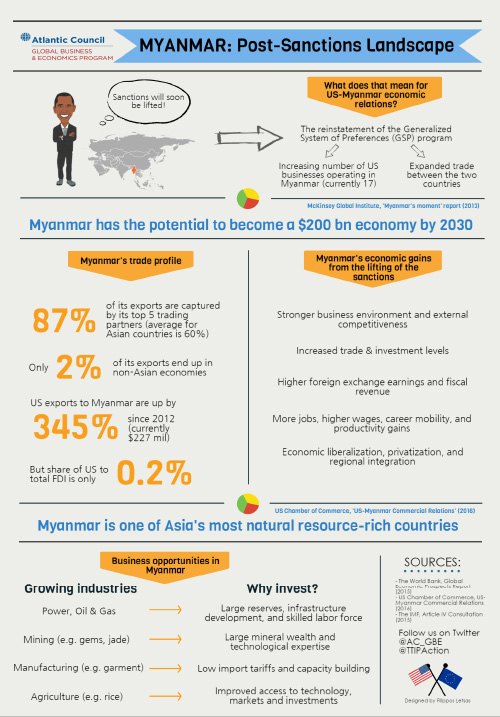On the occasion of Myanmar’s State Counselor Aung San Suu Kyi’s recent visit to the United States (U.S.), President Obama announced that executive sanctions on Myanmar would soon be lifted. This will grant Myanmar greater access to the U.S. market and encourage U.S. companies to invest in the country. Trade between the two countries remains at relatively low levels (i.e. $225 million in 2015), with U.S. investment to Myanmar accounting for only 0.2% of the country’s Foreign Direct Investment (FDI). Lifting the sanctions would remove a number of trade and investment barriers, which in turn would strengthen Myanmar’s competitiveness and foster growth across its economy. It would also allow the country to diversify its range of trading partners (e.g. only 2% of its exports end up in non-Asian economies).
To achieve regional and global integration, Myanmar must address existing challenges to greater investment and its broader economic development through structural reforms, including modernizing its regulatory regime, rebuilding its financial institutions, and containing the power and influence of the military. Foreign investors should recognize that Myanmar is one of Asia’s most natural resource-rich countries, offering a vast array of investment opportunities in the oil and gas, agriculture, and mining sectors primarily due to its location, technological expertise, and skilled labor force (i.e. in comparison to most Asian countries). Myanmar’s infrastructure development and capacity building also provides potential investors with favorable prospects in a number of labor-intensive industries, such as tourism and manufacturing; growing investment in these sectors would contribute to increasing foreign exchange earnings and the creation of new jobs, both of which are fundamental drivers for sustainable growth and prosperity in Myanmar.
